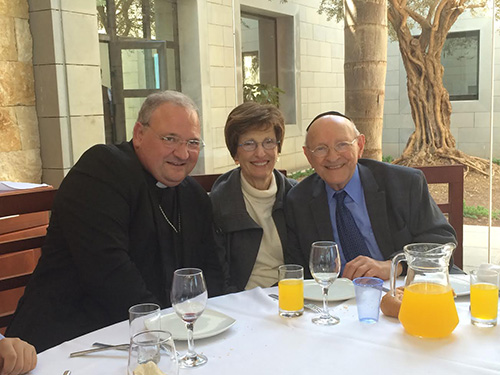By Tom Tracy - Florida Catholic
Miami Auxiliary Bishop Peter Baldacchino represented the Miami Archdiocese at a Catholic-Jewish interreligious convocation hosted May 4-7 by the Neocatechumenal Way in Israel. Following are his remarks to The Florida Catholic regarding the encounter, held along the Sea of Galilee in Israel.
What is the history and background of this unique encounter?
This meeting came about at the request of several rabbis ďż˝ particularly from Israel and New York ďż˝ who had listened to the symphonic catechetical composition "The Suffering of the Innocent," composed by Kiko Arguello, an initiator of the Neocatechumenal Way. Even if the aim of this musical piece was to express the suffering of the Blessed Virgin Mary beneath the cross of Jesus her son, many rabbis indeed felt that the pain conveyed by this work of art ďż˝ the suffering of an innocent mother ďż˝ was also expressing the affliction of the millions of innocent Jews murdered in the Shoah.
Therefore, they requested that Kiko bring this piece to the USA, where in 2012 it was performed at both the Boston and Chicago symphony halls, as well as at the Lincoln Center in New York City, particularly for Jewish audiences.

Photographer: COURTESY PHOTO
Miami Auxiliary Bishop Peter Baldacchino poses with Rabbi Solomon Schiff and his wife, Shirley, during one of their meals at the Domus Galilaeae during the meeting of Jewish and Catholic leaders, May 4-7 in Israel.
So the orchestral work was a spark for further encounters?
In 2013, the symphony was also played in front of the “Gate of Death” in Auschwitz, Poland. Archbishop Thomas Wenski, together with many rabbis, bishops and cardinals from Europe and all over the world, participated at that event along with some 40,000 people. Through these events many important representatives of European and U.S. Judaism ďż˝ for the first time in their lives ďż˝ felt the love and respect of the Catholic Church. They realized that the Neocatechumenal Way brings Catholics to appreciate the Old Testament and the Jewish faith through a serious itinerary of Catholic formation aimed to rediscover the richness and the roots of Christianity, i.e. Abraham, the Exodus, the history of salvation and so on.
Consequently, three important rabbis and three cardinals signed an invitation to this historical meeting that gathered 120 rabbis of every denomination, 7 cardinals, 20 bishops and many other Catholic scholars and representatives.
One point that I would say has been the center of our dialogue during those days was how to pass faith to the new generations, so threatened by secularization and agnosticism. As Rabbi (Irving) Greenberg, an important Jewish philosopher and scholar present to the gathering, said, "Judaism somehow needs the same kind of spiritual renewal that the Neocatechumenal Way is bringing to the Catholic Church.”
How did the setting on the Galilee help foster this conversation?
The location was a great help for the days we spent together. St. John Paul II wanted the Domus Galilaeae on the Lake of Tiberias to be a meeting point between Christians and Jews. We spent days of true communion and love, discussing, talking and praying together. One day a rabbi led a prayer service, and the following day Cardinal (Christoph)Schoenborn of Austria, led Morning Prayer for all Catholics and Jews united together. For the Jewish feast of Lag B'Omer, we lit a bonfire and danced together around it.
One rabbi from Holland shared his experience of how he had been saved by a Catholic family when he was a baby in Amsterdam during the Second World War. His wife, who was present to the meeting, said she was hosted during the war by seven different Catholic families. We all felt that when they recalled how God had saved them through people of a different faith, the Holy Spirit was truly present among us.
The beauty of the location, the view on the Lake of Tiberias and the remarkable aesthetic of the Domus Galilaeae spoke of the love of God for humankind and of the love of the Church for our older brothers in faith.
Rabbi Greenberg expressed the experience of these days, quoting the Book of Proverbs: "As water reflects the face of a person so others reflect your heart back to you." As they felt loved by us, they loved us in return.
Are there any expected follow up actions?
This experience will probably be repeated, and we are confident that many more rabbis will attend. We came back from the meeting committed to continue nourishing the new friendships we developed there. We know that we face common spiritual threats and that only in being together we can overcome them. We are now planning new events, firstly among ourselves, and then open to our communities.

